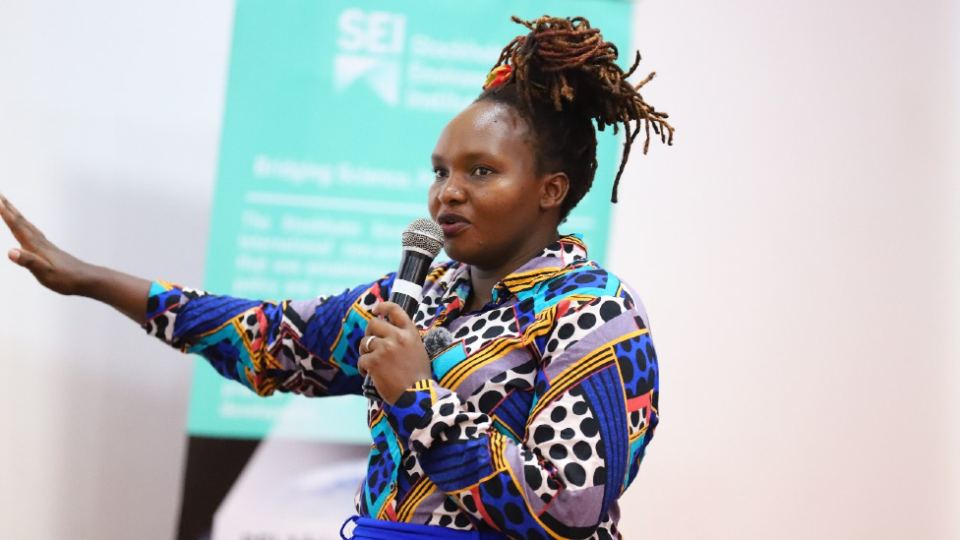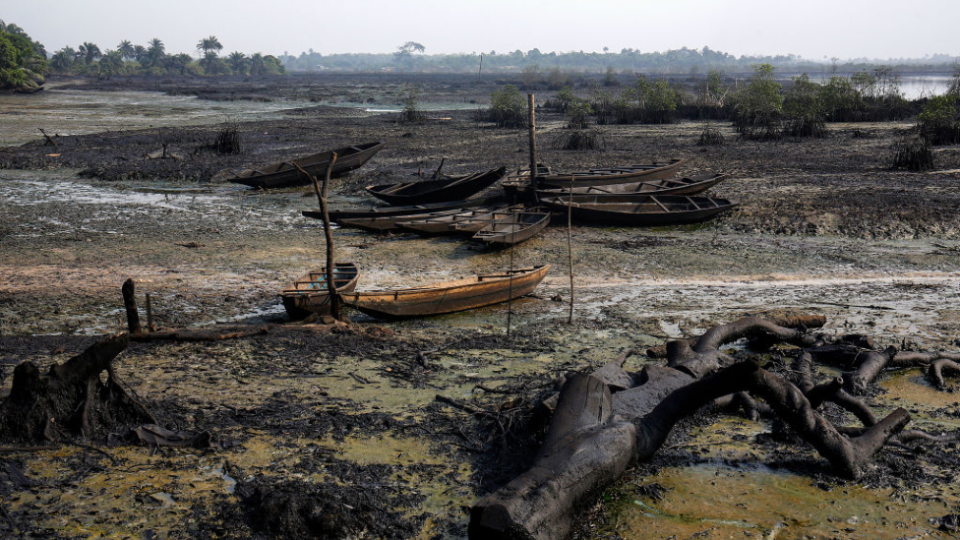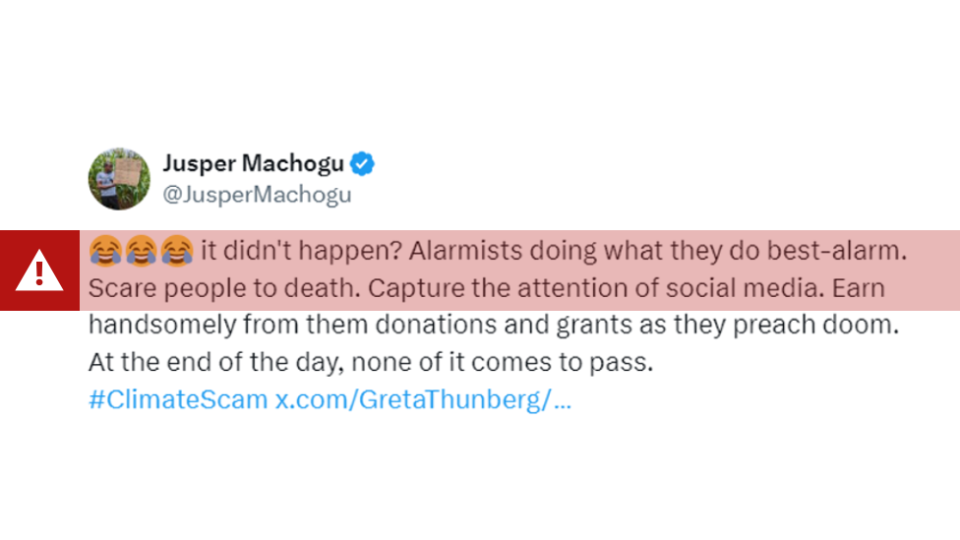Climate change deniers have found a new advocate in Kenyan farmer Jusper Machogu. He has become known on social media as a champion of fossil fuels in Africa, but there is more to his campaign than meets the eye.
At first glance, 29-year-old Machogu is just a young farmer with a knack for social media.
On X, formerly Twitter, he regularly posts videos of himself weeding his land, planting garlic or picking avocados – giving viewers an insight into life in rural Kisii in southwest Kenya.
While his agricultural content gets him clicks, likes and retweets, it is Machogu’s denial of man-made climate change that has helped him gain a huge online presence.
Since he began publishing debunked theories about climate change, he has received thousands of dollars in donations – some of them from individuals in Western countries with ties to the fossil fuel industry.
Mr Machogu stresses that his views have not been influenced by this and says that they are honest views.
Scientists have proven that the Earth is warming due to greenhouse gases released into the atmosphere when fossil fuels such as oil, gas or coal are burned.
But Mr Machogu disagrees.
“Climate change is mostly natural. A warmer climate is good for life,” Mr Machogu falsely claimed in a tweet posted in February, along with the hashtag #ClimateScam (which he has used hundreds of times).
According to the Intergovernmental Panel on Climate Change (IPCC), Africa is one of the countries with the smallest contribution to greenhouse gas emissions that cause climate change.
However, it is also “one of the continents most affected by climate change and its impacts – which include more frequent and intense heatwaves, prolonged droughts and devastating floods.”
Despite all this, Mr Machogu continues to insist that there is “no climate crisis”.
On social media, he repeatedly posted unsubstantiated claims that man-made climate change was not only a “hoax” or “hoax,” but also a ploy by Western nations to “keep Africa poor.”
“[His views] “The problems are definitely due to a lack of understanding,” says Joyce Kimutai, a climate scientist from Kenya who contributed to the IPCC reports.

“This is not a religion, it is not just belief. It is about analyzing the data and recognizing changes in the data.”
“Saying the climate [change] is a hoax, it is simply not true,” added Dr. Kimutai.
Mr Machogu began tweeting false and misleading claims about climate change in late 2021 after conducting his “original research” on the issue.
Since then, he has launched his own campaign, which he calls “Fossil Fuels for Africa,” in which he argues that the continent should develop its vast oil, gas and coal reserves.
“We need fossil fuels to develop our Africa,” Mr Machogu tweeted last year.
This view appears to be shared by some African governments, which have given the green light to new oil and gas projects despite their promises to “phase out” fossil fuels.
Politicians like Ugandan President Yoweri Museveni argue that it is hypocritical for the West to impose restrictions on African states that have become rich through fossil fuel extraction.
But climate activists like 24-year-old Nicholas Omonuk from Uganda point out that the search for fossil fuels in Africa has not always been synonymous with growth and development.
“In [Nigeria’s] “Oil has been produced in the Niger Delta since the 20th century, but people there are still poor and suffer from health risks and environmental pollution,” he said.


And yet Mr. Machogu believes he has found a willing audience for his message – he has more than 25,000 followers on X.
“I think Africans are really taking my message ‘Fossil fuels for Africa’ on board,” he told the BBC.
But by tracking conversations under Mr Machogu’s X-name, BBC Verify found that most of the users who interacted with his account were actually based in the US, UK and Canada.
Many of these users also spread conspiracy theories on the Internet – not only about climate change, but also about vaccines, Covid-19 or the war in Ukraine.
No matter how narrow-minded their views, this online community has pledged its support to Mr. Machogu and helped him finance his campaign.
“By saying everything I say, I noticed my follower count increasing and people reaching out to me and asking, ‘How can we help you?'” he said.


BBC Verify examined fundraising pages set up by Mr Machogu and found that he has raised more than $9,000 (£7,000) in donations over the past two years.
Mr Machogu has stated online that he will use part of these funds to furnish his new home.
But he also claims to have used the donations to support dozens of local families by digging a borehole for water, distributing gas bottles for cooking or connecting their homes to the electricity grid.
His donors included people with ties to the fossil fuel industry and groups known for their climate change denial.
But Mr Machogu rejects the suggestion that these donations influenced his views on climate change.
“Nobody told me to change my views,” insists Mr Machogu.
“I have no problem making money while saying what I think should be said or doing what is good for my community.”
Podcast: The Kenyan influencer who denies climate change
By sharing his views online, he undoubtedly caught the attention of many people in the West who share his stance on fossil fuel extraction and climate change.
Canadian author Jordan Peterson retweeted one of his posts about fossil fuels, describing himself as a “real African,” in contrast to what Mr Peterson called the “poor, oppressed, useless African” supposedly envisioned by “globalist utopians.”
A US fossil fuel activist funded a trip for Mr Machogu to South Africa late last year to attend a conference on developing African oil and gas reserves.
And just months earlier, a film crew from the UK had travelled to Kisii to interview him for a new documentary that described climate change as an “eccentric eco-anxiety”.
For some, Mr Machogu’s newfound popularity came as no surprise.
“There has been a real explosion in the development of fossil fuel projects in Africa,” says Amy Westervelt, a U.S.-based investigative climate reporter who reports on attempts to block climate policy.
“And because many countries are taking policies to limit the use of fossil fuels, Africa is also seen as a big market.
“That’s why it’s very helpful when there are people in Africa who say: ‘We want these projects.'”
This is certainly a point that Mr Machogu has raised repeatedly on social media.
But Dr Kimutai says his promotion of fossil fuels and his denial of man-made climate change could have consequences.
“Because climate literacy is still low in Africa and Kenya, and if this conspiracy theory spreads in communities or among people, it could significantly damage climate action.
“This is really, really dangerous.”
More stories from BBC Verify:
